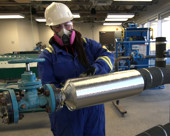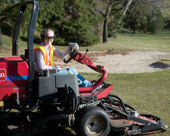
As a post-secondary student, you may have been working to help pay for your education and invest in your future. And, you’re looking forward to finding a job in your field after graduation. But not everyone has an easy time finding work that’s relevant to their education or in line with their career goals.
Whether you’ve recently graduated or are still studying, you can follow these 4 steps to help you successfully transition into the work you’ve been studying for.
1. Revisit your career plan
When you entered your post-secondary program, you probably had a specific occupation in mind. Your studies may have reinforced your interest in your career goals but through them you might also have discovered new career options or new ways to apply your training. Or things may have changed in your life and in the labour market that could make you reconsider your goals. Whether you’re still in post-secondary or recently graduated, now is an excellent time to revisit your career plan. And, if you haven’t started a career plan, go to CAREERinsite. This online career planning tool will help you align your life and work with your skills, interests, and dreams.
Other ways of exploring your career plan include revisiting occupations on alis and elsewhere to review your options and consider how broader trends in the workplace might affect your chosen line of work. You might also look at job postings in your field, explore Alberta’s latest wage and salary data, and look at earnings for your post-secondary field of study. This will give you a better sense of what employers might offer you once you’re done school and employed in your field. Recognize that, as someone without a lot of work experience, your initial earnings will likely be at the lower end of those ranges.
2. Update your work search tools
It’s always good to keep your work search tools updated so you’ll be ready whenever an opportunity arises.
- Student job banks and college career centres continue to be helpful, even after you graduate. But you should also be looking at major employers in your industry and other job banks that will help you find jobs that move you closer to your career goals.
- Build your resumé, cover letter, and references. If you don’t have a lot of past work experience, consider using a functional resumé format to focus attention on your skills and accomplishments. And know that you’ll continue to edit and adapt these materials to suit each new job you apply for.
- If you have a work-oriented social media profile, make sure it is up to date. More and more employers are now going to social media sites to find information about potential hires. Make sure your social media networks will make a positive impression on employers and other work-related contacts should they look you up online.
- Prepare for success at your job interviews. Bring a positive attitude, present yourself as a well-groomed professional, and show that you’ve researched the company and the job opportunity.
3. Learn about the labour market
The labour market changes constantly in response to supply and demand. It is influenced by local and global changes in population, technology, and the economy. Things may be different now than when you first entered your post-secondary program. Use some of the following resources to learn about labour market trends in your chosen field or others that might be related:
- You can learn more about short-term trends by checking out monthly labour force statistics and annual labour market reviews for Alberta. Also see job market trends and profiles in Alberta for reports on monthly vacancy rates by industry and profiles of Alberta's major industries.
- The Canadian Occupational Projection System has forecasts for the Canadian labour market. These can help you understand national trends. As well, the Government of Canada lets you explore careers by outlooks. This tool offers 2-year employment forecasts by occupation for the entire country, with results organized by province and city. You can also explore news items about labour market trends in the past 4 weeks for each province.
Labour market trends are often cyclical. If employment for your chosen field is currently competitive, consider investing in further training or experiences that will give you an edge over other students in your field. You can also seek employment in a closely related field that might be emerging or in higher demand.
As with all labour market information, do your best to consult multiple sources and check the dates of the forecasts to see if they are current. If the forecast is out of date, you'll need to consider whether or not the trends it identifies still hold true for you today.
4. Build your experience
Because you’re just finishing or have finished school, you might not have the work experience employers in your field are looking for. As part of your plan to enter the workforce, you may need to find ways to offset your initial lack of experience. Thankfully, you don’t always need direct job experience to show employers you have many of the skills they are looking for. Think about the core, transferable skills you gained during your classes, while working and volunteering, or during a co-op program or internship:
- Remember all those essays and presentations? They demonstrate communication skills.
- What are exams if not evidence of problem-solving? Or maybe you helped iron out a scheduling problem at the campus food bank. Any time you pitch in or take the lead to help others, you're probably practicing your problem-solving skills. Look to these instances for examples you can add to your resumé.
- If you incorporated feedback, or took part in group work while also doing solo projects, you showed you can be adaptable and a team player.
- You worked with minimum supervision and planned your time to achieve your goals, which shows how you can work independently.
Take the time to identify significant experiences in your life and think about the skills that those events might have demonstrated. Continue practicing and thinking about these skills as you gain new experiences.
Now you’re ready to show potential employers that you have the training and skills they need. But what if you can’t find the job you want right away? While you continue your studies or search for work in your field, always look for ways to build experience, increase your knowledge, and develop your transferable skills. Check out these ideas to get started:
- Internships. Apply for an internship to gain job skills in a workplace setting and build relationships with an employer in your field. Search job banks for internship opportunities.
- Networking. Use your networking skills to contact people who know you. Grow your network to include people in your chosen field. Tell them what you plan to pursue for work and seek their advice.
- Campus career services. Contact your campus career services office. Explain that you are looking for work or volunteer opportunities. Tell them you want to build your transferable skills, knowledge, and work experience so that you are better qualified for the job you want.
- Career fairs. Attend career fairs to make industry contacts and conduct informal interviews with these businesses. Learn about the skills, experience, and qualities employers need, and find out about upcoming job openings.
- Information interviews. Set up information interviews to show your interest in various companies and learn more about them.
- Career-related jobs. Even a part-time job in a related field may be a great way to gain relevant experience. When searching for occupations, use your field of study to filter results and find related occupations that may have additional job postings available.
- Volunteer opportunities. You can gain workplace experience and more by volunteering. You can find volunteer opportunities at Go Volunteer. To find a volunteer centre near you, visit Volunteer Alberta.
- Self-employment. To build the experience you need, you might be able to freelance or start your own business. To help you decide if that’s a good fit for you, explore these self-employment resources.
- Informal learning. If you are looking for hands-on experience, try asking people in your network to teach you a skill. You can also look for a mentor, someone who can guide you and give you advice about your career.
Start now
The sooner you follow these 4 steps, the sooner you can address the experience gap that many students face when they first graduate from post-secondary. By revisiting your career plan, updating your work search tools, learning about the labour market, and building your experience, you’ll present yourself to future employers as a skilled and valuable hire in your field.

















